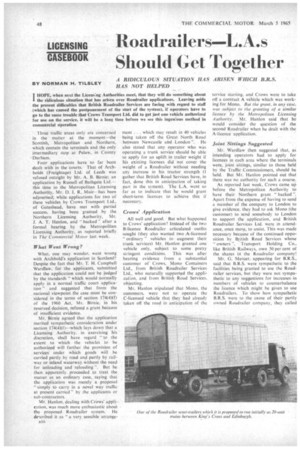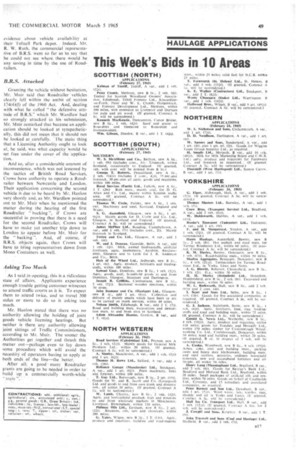Roadrailers—L.A.s Should Get Together
Page 50

Page 51

If you've noticed an error in this article please click here to report it so we can fix it.
A RIDICULOUS SITUATION HAS ARISEN WHICH B.R.S. HAS NOT HELPED
BY NORMAN H. TILSLEY
I HOPE, when next the Licens:ng Authorities meet, that they will do something about 1 the ridiculous situation that has arisen over Roadrailer applications. Leaving aside the present difficulties that British Roadrailer Services are facing with regard to staff (which has caused the postponement of the start of the system), if operators have to go to the same trouble that Crows Transport Ltd. did to get just one vehicle authorized for use on the service, it will be a long time before we see this ingenlous method in commercial ciperation Three traffic areas only are concerned in the matter at the moment—the Scottish, Metropolitan and Northern, which contain the terminals and the only intermediary stop at Pelaw, in County -Durham.
Four applications have so far been dealt with in the courts. That of Arch' bolds (Freightage) Ltd. of Leeds was refused outright by Mr. A. B. Birnie: an application by Russell of Bathgate Ltd.— this time to the Metropolitan Licensing Authority, Mr. D. I. R.. Muir--has been adjourned; while applications for two of these vehicles by Crows Transport Ltd.. of Gateshead, have met with partial success, having been granted by the Northern Licensing Authority, Mr. 1. A. T. Hanlon, and backed after a formal hearing by the Metropolitan Licensing Authority, as reported briefly in The Commercial Motor last week.
What Went Wrong?
What, one may wonder, went wrong with Archbold's application in Scotland? Despite the fact that Mr. T. H. Campbell WardIaw, for the applicants, submitted that the application could not be judged by the standards which would normally apply in a normal traffic court application" and suggested that from the national viewpoint the case must be considered in the terms of section 174(4Xf) of the 1.960 Act, Mr. Birnie, in his reserved decision, refused a grant because of insufficient evidence.
Mr. Birnie agreed that the application merited sympathetic consideration under section 174(4)(f)—which lays down that a Licensing Authority, in exercising his discretion, shall have regard "to the extent to which the vehicles to be authorized will further the provision of services under which goods will be carried partly by road and partly by railway or inland waterway without the need for unloading and reloading ". But he then apparently proceeded to treat the matter as an ordinary case, saying that the application was merely a proposal "simply to carry in a novel way traffic at present carried" by the applicants or sub-contractors.
Mr. Hanlon, dealiag with Crows' application, was much more enthusiastic about the proposed Roadrailer system. He described it as a very sensible arrange u1 ment . which may result in 40 vehicles being taken off the Great North Road between Newcastle and London ". He also stated that any operator who was operating a trunk service should be able to apply for an uplift in trailer weight if his existing licences did not cover the weight of a Roadrailer without needing any increase in his tractor strength (I gather that British Road Services have, in fact, done this in anticipation of taking part in the system). The LA, went so far as to indicate that he would grant short-term licences to achieve this if necessary.
Crows' Application All well and good. But what happened to Crows' application? Instead of the two B-licence Roadrailer articulated outfits sought (they also wanted two A-licensed " ordinary " vehicles to augment their trunk services) Mr. Hanlon granted one vehicle only, subject to some pretty stringent conditions. This was after hearing evidence from a substantial customer or Crows, Mono Containers Ltd., from British Roadrailer Services Ltd., who naturally supported the application, and from British Road Services. objecting.
Mr. Hanlon stipulated that Mono, the customers, were not to operate the C-licensed vehicle that they had already taken off the road in anticipation of the
service starting, and Crows were to take off a contract A vehicle which was working for Mono. But the grant, in any case, was subject to the granting of a similar licence by the Metropolitan Licensing Authority. Mr. Hanlon said that he would consider the question of the second Roadrailer when he dealt with the A-licence application.
Joint Sittings Suggested Mr. Wardlaw then suggested that, as intending operators had to apply for licences in each area where the terminals were, joint sittings, similar to those held by the Traffic Commissioners, should be held. But Mr. Hanlon pointed out that there was no authority for such a course.
As reported last week, Crows came up before the Metropolitan Authority to have their Northern grant " backed ". Apart from the expense of having to send a member of the company to London, to give evidence, they had to ask Mono (the customer) to send somebody to London to support the application, and British Roadrailer Services Ltd. were in attendance. once more, to assist. This was made necessary because of the continued opposition by British Road Services whose "owners". Transport Holding Co., like British Railwa),s, own 50 per cent of the shares in the Roadrailer company!
Mr. G. Mercer, appearing for B.R.S., said that B.R.S. were sympathetic to the facilities being granted to use the Roadrailer services, but they were not sympathetic to any suggestions for increases in numbers of vehicles to counterbalance the licence which might be given to use Roadrailers. To show how sympathetic B.R.S. were to the cause of their partly owned Roadrailer company, they called evidence about vehicle availability at their Tufaell Park depot. Indeed, Mr. R. W. Ruth, the commercial representative of B.R.S. went so far as 'to say that he could not • see where. there -Would be any saving in tine by the use Of Roadrailers.
B.R.S. Attacked Granting the vehicle without hesitation, Mr. Muir said that: Roadritiler 'vehicles clearly fell within theambit of section 174(4)(1) of the 1960 Act. And, dealing with what, he called " the defensive attitude of B.R.S.". which Mr. Wardlaw. had so strongly attacked in: his submission, Mr. Muir reniarked that because an application should be looked at sympathetically, this did not mean that it should not he looked at .carefulty. The main thing that a' Licensing Authority ought to look af, he said, was what ,capacity .would be set free under the cover of the application.
Add so, after a considerable amount of' inconvenience, which was not lessened by the -tactics of British Road Services, Crows have authority to operate a Roadrailer between Newcastle and London. Their application concerning the second vehicle is due to be heard by Mr. Hanlon very shortly and, as Mr. Wardlaw pointed out to Mr. Muir when he mentioned the matter during the hearing of the first Roadrailer " backing r, if Crows are successful in proving that there is a need for the second Roadraffer. Crows will have"to make yet another trip down to London .to appear before Mr. Muir for the " backing ". And, of course, if B.R.S. Objects again. then Crows will have to bring representatives down from Mono Containers as well.
Asking Too Much As 1 said in opening, this is a ridiculous state of affairs. Applicants experience enough trouble getting customer witnesses to attend traffic courts as it is. To expect them to attend twice, and to travel 300 miles or more to . do so is asking too much.
Mr. Hanlon stated that there Was no authority allowing the holding of joint goods vehicle licensing hearings. But neither is there, any. authority allowing joint sittings of Traffic Commissioner, according to Mr. Muir. The sooner the Authorities get .together and thrash this matter out--:--perhaps even to lay down some procedure which will avoid the necessity of operators having tO apply at both ends of the line-the better.
After all. a good many Roadrailer grants are going to be needed in orderto' build Up a commercially Worth-while " train ".




























































































































































